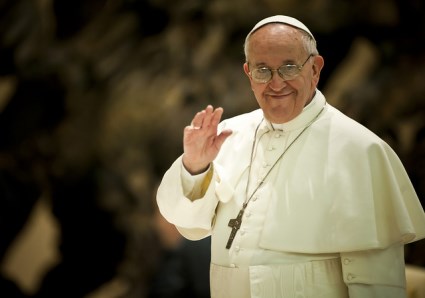 America Magazine, along with La Civiltà Cattolica and other Jesuit publications around the world, has published an interview with Pope Francis, well worth the read. Among other things, the pope talks about prayer.
America Magazine, along with La Civiltà Cattolica and other Jesuit publications around the world, has published an interview with Pope Francis, well worth the read. Among other things, the pope talks about prayer.
Prayer for me is always a prayer full of memory, of recollection, even the memory of my own history or what the Lord has done in his church or in a particular parish. For me it is the memory of which St. Ignatius speaks in the First Week of the Exercises in the encounter with the merciful Christ crucified. And I ask myself: ‘What have I done for Christ? What am I doing for Christ? What should I do for Christ?’ It is the memory of which Ignatius speaks in the ‘Contemplation for Experiencing Divine Love,’ when he asks us to recall the gifts we have received. But above all, I also know that the Lord remembers me. I can forget about him, but I know that he never, ever forgets me. Memory has a fundamental role for the heart of a Jesuit: memory of grace, the memory mentioned in Deuteronomy, the memory of God’s works that are the basis of the covenant between God and the people. It is this memory that makes me his son and that makes me a father, too.
Read the whole thing.
Photo by Catholic Church (England and Wales) under a Creative Commons license.

Prayer is a tonic for our lives. Lord teach us to pray.
I offered it to Intro to Religion students (Jesuit university) yesterday as an extra credit assignment. They just finished reading Just Call Me Lopez, so they should pick up on the Ignatian stuff easily.
And btw, on the subject of college education: I have a student who told me that his team has AMDG inscribed on their football helmets, and another who told me that he made the school’s Manresa retreat last year — and both said they didn’t know what the acronym/name meant until they read the book and we discussed it. Leave it to a Presbyterian . . .
I didn’t know either nor do I know Latin although I can figure out some of it with my Italian. Someone here explained it to me when I asked however if we want the masses to understand terminology or acronyms we should use English. Especially since Vatican II.
Or explain them. I was noting that often we forget to explain things of importance to us, assuming that others “get” it — something of which I am extremely guilty on a regular basis
One of the things my students and I have been discussing is the importance of narrative — that we are built for story, something Jesus knew well. If they read the story of Ignatius at Manresa (in Margaret Silf’s book, for instance), they are more likely to remember the significance of the place name than if you use it without explanation (and yes, it may have been explained to them thoroughly — we are also people of short memory) or slap it on a vocabulary list of words to be defined and memorized.
I just found some humor in who it was who sharing these things with them this month.
Yep and I saw a teaching opp — people expect their kids to grow up and just know things . Such as who that relative is my grownups talk about all the time or are they a friend? Stuff like that. Happens all the time.
I had a theology class last evening and we discussed a number of portions of this interview. This portion on prayer spoke powerfully to many of us in the class. It helps that I attend a Jesuit college – we’re rather fond of Our Holy Father!